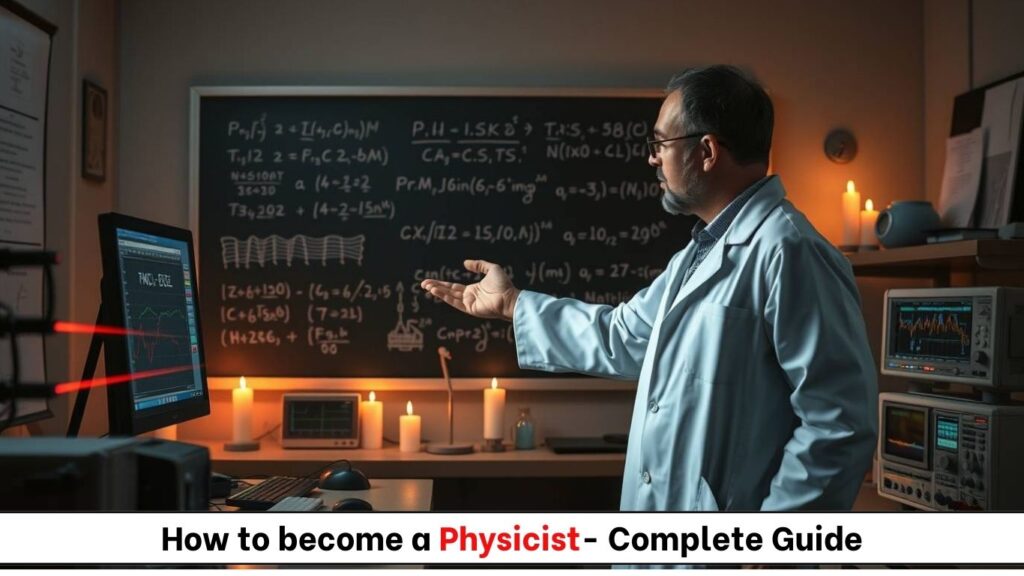
Introduction
Physics is the fundamental science that seeks to understand the universe—from the smallest subatomic particles to the vastness of galaxies. A physicist is a scientist who studies matter, energy, and the forces governing their interactions. Whether developing quantum computers, exploring space, or advancing medical imaging, physicists push the boundaries of human knowledge.
If you’re fascinated by how the universe works, enjoy solving complex problems, or dream of groundbreaking discoveries, a career as a physicist could be your calling. This blog covers:
- History of Physics
- Roles and Responsibilities of a Physicist
- Salary Expectations
- Required Qualifications & Skills
- How to Get Started in Physics
- Future Scope of Physics
Let’s dive in!
History of Physics
Physics has evolved over millennia, shaping our understanding of reality. Here’s a brief timeline:
Ancient & Classical Physics (Pre-1600s)
- Aristotle (4th century BCE): Early theories on motion and cosmology (later disproven).
- Archimedes (3rd century BCE): Discovered principles of buoyancy and levers.
Scientific Revolution (1600s-1800s)
- Galileo Galilei (1600s): Father of modern physics; pioneered the scientific method.
- Isaac Newton (1687): Laws of motion and universal gravitation.
- James Clerk Maxwell (1865): Unified electricity and magnetism into electromagnetism.
Modern Physics (20th Century-Present)
- Albert Einstein (1905 & 1915): Special and General Relativity revolutionized space-time concepts.
- Quantum Mechanics (1920s): Schrödinger, Heisenberg, and Bohr explained atomic behavior.
- Particle Physics (1950s-now): Discovery of quarks, Higgs boson (2012), and quantum computing.
- Astrophysics & Cosmology: Hubble’s expansion theory, black hole imaging (2019), and dark matter research.
Today, physics drives innovations in technology, medicine, and space exploration.
Roles and Responsibilities of a Physicist
Physicists work in academia, industry, and government, with roles varying by specialization:
1. Theoretical Physics
- Develop mathematical models to explain natural phenomena (e.g., string theory, cosmology).
- Work on quantum mechanics, relativity, and particle physics.
2. Experimental Physics
- Conduct lab experiments (e.g., CERN’s Large Hadron Collider).
- Test hypotheses in condensed matter, nuclear, or optical physics.
3. Applied Physics (Industry & Engineering)
- Develop new technologies (semiconductors, lasers, medical imaging).
- Work in aerospace, renewable energy, or telecommunications.
4. Astrophysics & Space Science
- Study galaxies, black holes, and exoplanets.
- Work with NASA, ESA, or private space companies like SpaceX.
5. Medical Physics
- Improve radiation therapy and MRI technology.
- Ensure safe use of medical imaging devices.
6. Computational Physics
- Simulate complex systems using supercomputers.
- Apply machine learning to physics problems.
Salary of a Physicist
Salaries depend on specialization, experience, and sector:
| Country | Entry-Level Salary (Annual) | Experienced Salary (Annual) |
|---|---|---|
| USA | $60,000 – $80,000 | $90,000 – $150,000+ |
| UK | £30,000 – £45,000 | £50,000 – £90,000 |
| India | ₹4,00,000 – ₹6,00,000 | ₹10,00,000 – ₹20,00,000+ |
| Germany | €45,000 – €60,000 | €70,000 – €100,000 |
Highest-paying sectors: Aerospace, quantum computing, and private research labs.
Qualifications & Skills Required
Educational Qualifications
- Bachelor’s Degree (B.Sc/B.Tech in Physics, Engineering Physics, or Astrophysics) – Foundation for entry-level jobs.
- Master’s Degree (M.Sc/M.Tech in specialized physics fields) – Needed for advanced roles.
- PhD – Essential for research scientists, professors, and high-level industry positions.
Key Skills
- Mathematical Proficiency: Calculus, differential equations, linear algebra.
- Programming: Python, MATLAB, C++ for simulations and data analysis.
- Lab & Research Skills: Spectroscopy, particle accelerators, quantum experiments.
- Soft Skills: Critical thinking, problem-solving, teamwork.
Certifications (Optional but Helpful)
- Certified Health Physicist (CHP) – For medical/radiation physics.
- Project Management Professional (PMP) – For industry roles.
How to Get Started in Physics
Step 1: Build a Strong Foundation
- After 12th (Science with Physics, Maths, Chemistry), pursue a B.Sc/B.Tech in Physics or related fields.
- Top Colleges:
- India: IITs, IISc, TIFR, DU
- USA: MIT, Caltech, Harvard, Stanford
- UK: University of Cambridge, Imperial College London
Step 2: Gain Research Experience
- Internships: Work at research labs (ISRO, CERN, NASA-affiliated programs).
- Projects: Participate in Olympiads, publish papers, or join university research.
Step 3: Specialize with Higher Education
- Choose a focus (e.g., quantum physics, astrophysics, biophysics).
- A PhD is crucial for academia and advanced R&D.
Step 4: Network & Stay Updated
- Join societies like the American Physical Society (APS) or Institute of Physics (IOP).
- Attend conferences (e.g., March Meeting, Lindau Nobel Laureate Meetings).
Step 5: Enter the Job Market
- Entry-Level: Research Assistant, Lab Technician
- Mid-Level: Data Scientist, Optical Engineer
- Senior-Level: Senior Scientist, Professor, Chief Physicist
Future Scope of Physics
Physics is at the forefront of futuristic innovations:
1. Quantum Technologies
- Quantum Computing: Solving problems impossible for classical computers.
- Quantum Cryptography: Unhackable communication systems.
2. Space Exploration
- Mars Colonization: Physics drives propulsion and life-support systems.
- Dark Matter Research: Unlocking the universe’s hidden 85% mass.
3. Renewable Energy
- Nuclear Fusion: Clean, limitless energy (ITER project).
- Advanced Solar Cells: Higher efficiency photovoltaics.
4. Medical Breakthroughs
- Proton Therapy: Precision cancer treatment.
- Nanomedicine: Targeted drug delivery using nanoparticles.
5. AI & Physics
- Neural Networks in Research: Accelerating particle collision analysis.
- Automated Experiments: AI-driven lab assistants.
Job Market Growth: Physics careers are projected to grow 7% annually, with high demand in tech, energy, and space sectors (Source: U.S. Bureau of Labor Statistics).
Conclusion
A career as a physicist offers endless opportunities to explore the mysteries of the universe and drive technological progress. Whether you’re simulating black holes, developing quantum algorithms, or improving medical tech, physics is a gateway to shaping the future.
Start with a strong academic foundation, engage in research early, and stay curious. The universe has many secrets left to uncover—will you be the one to reveal them?
Are you considering a career in physics? Share your aspirations in the comments!













Post Comment